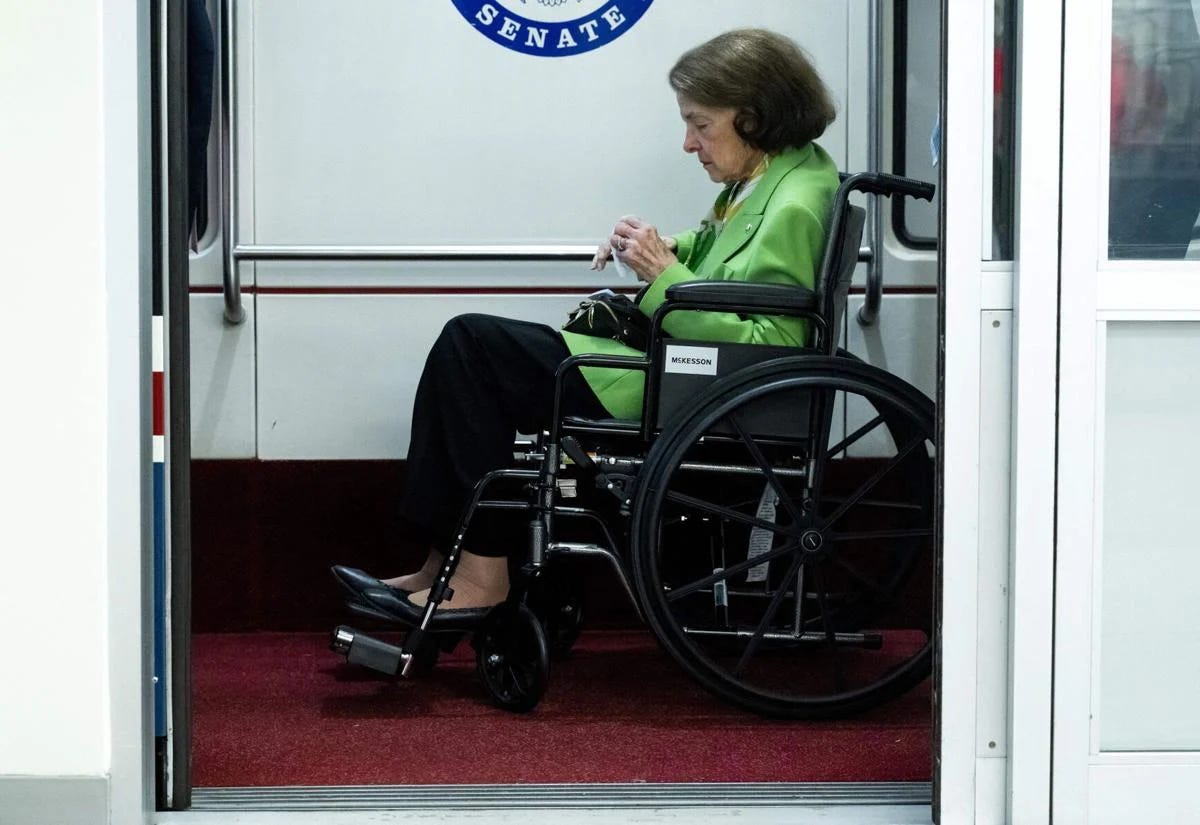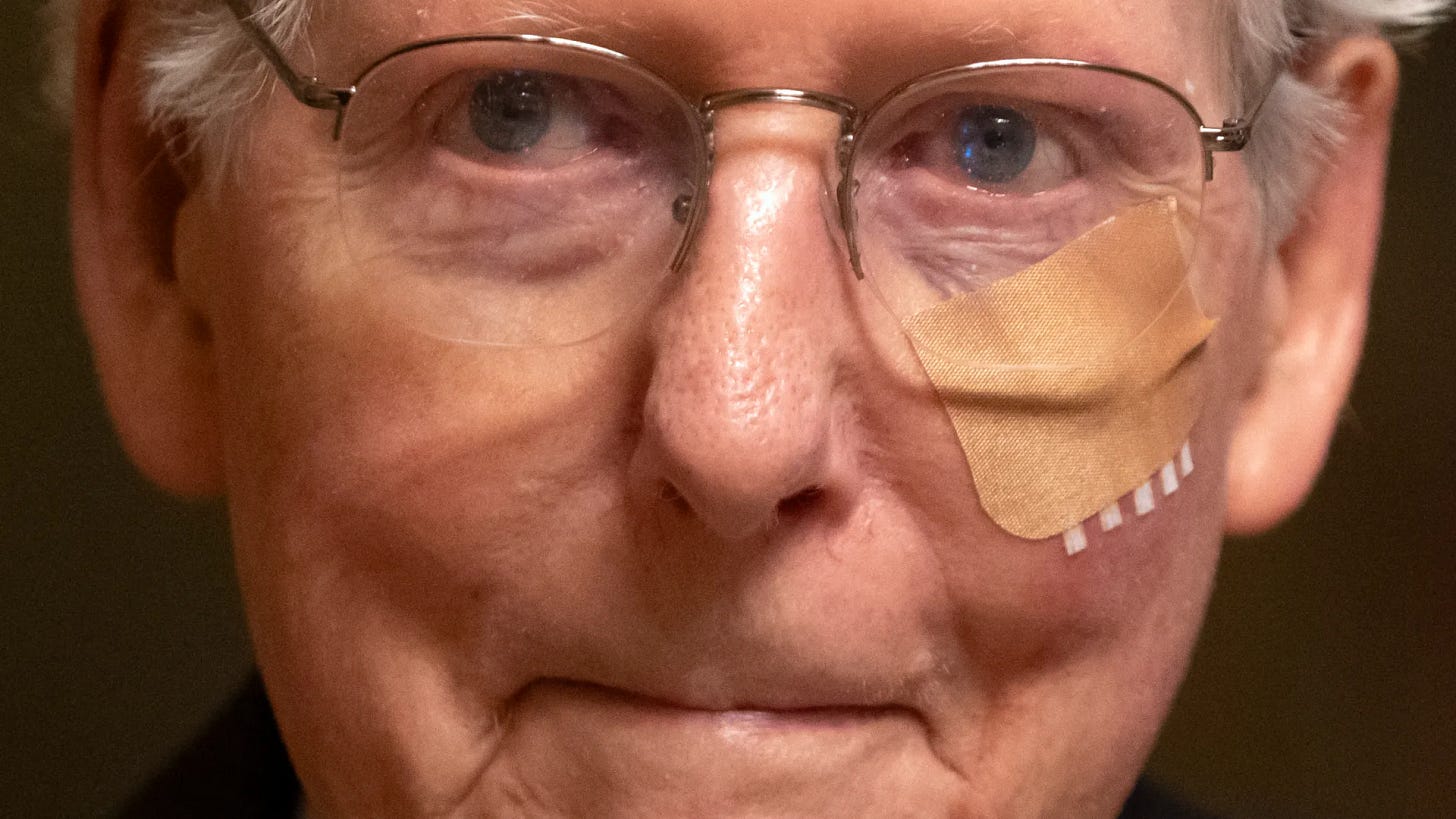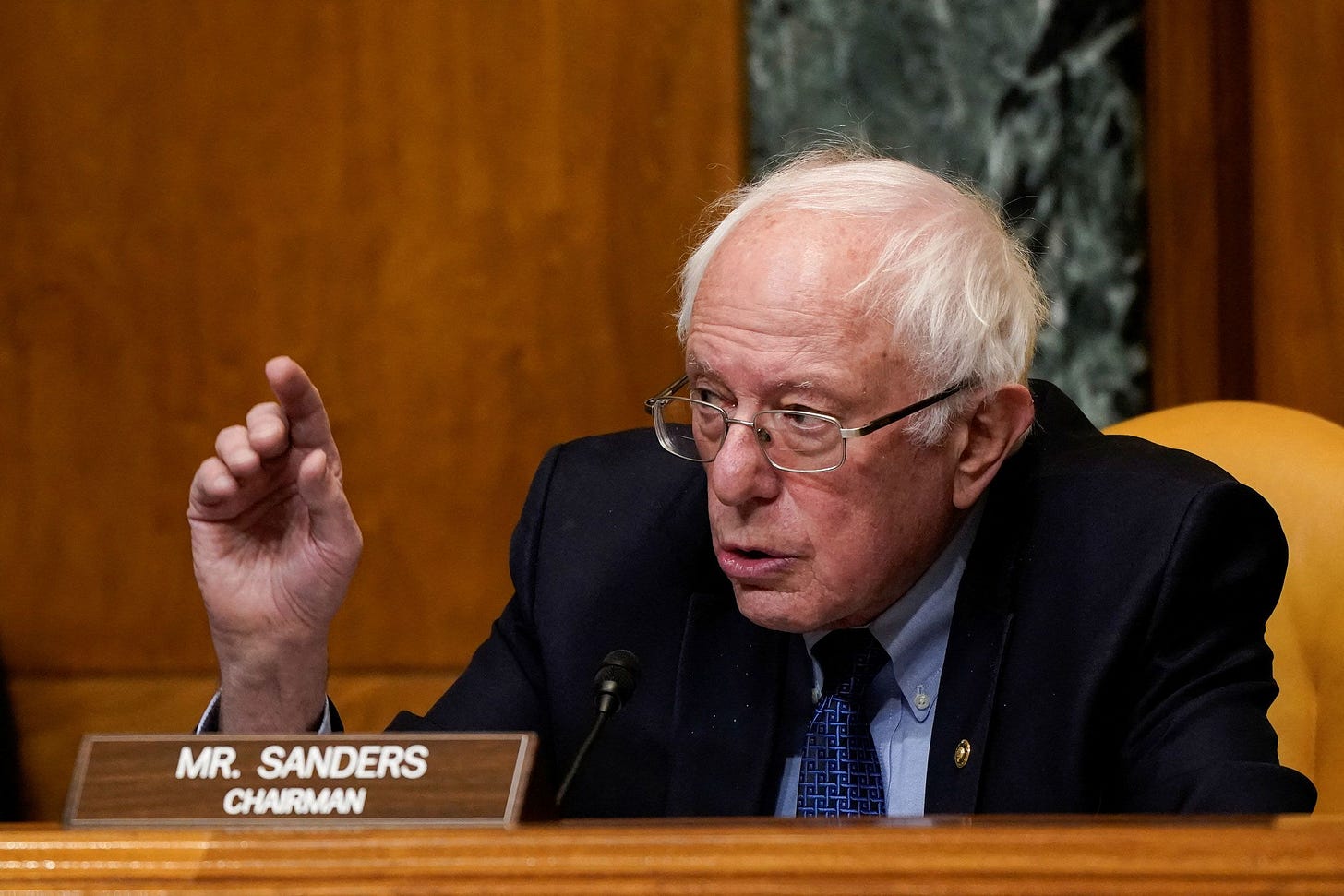The case for term and age limits
Is Capitol Hill the shining beacon of Democracy or a glorified retirement home (with better catering)?
Last week, the House of Representatives narrowly passed a joint budget resolution, teeing up a massive reconciliation package in the coming weeks. The budget extends the 2017 Trump tax cuts and authorizes another $1.5 trillion in additional tax cuts. No matter your thoughts on its merits, this was a big vote—and a big win for the GOP’s narrow House majority.
The vote would have failed if House Democrats were at full strength. The resolution passed 216-214, with a pair of GOP nays from Thomas Massie (R-KY) and Victoria Spartz (R-IN). But three reliable—and potentially decisive—Democratic votes were conspicuously absent. Why?
New Jersey’s Democrat Don Norcross (age 66) was hospitalized with a medical emergency and was a no-show. Texas’ Sylvester Turner (70) and Arizona’s Raul Grijalva (77) also couldn't make it — both died in March. Their seats, both Democratic strongholds, will be empty until at least September.
The story behind Texas’s 18th district, Turner’s seat, is sad and bizarre. He had been elected in January and was only on the job for two months before succumbing to “a medical emergency.” Turner had succeeded Shirley Jackson Lee, who schlepped back and forth to Washington for 30 years before passing away in July 2024 at age 74. Two up, two down, leaving inner city Houston without representation for the better part of nine months.
And who can forget (pun intended) the sad case of Dianne Feinstein (D-CA), who was wheeled in and out of Capitol Hill for several years, debilitated and silent, until she passed away at age 90 in September 2023.
Then there’s Mitch McConnell, the Kentucky fried Republican senator who famously went catatonic for almost two minutes at the microphone last year at a press conference. He still drops by (rolls in, I should say … he’s in a wheelchair) to chambers to vote, then is whisked back to his DC home and put to bed. In his 40th year in Congress, McConnell (83) is perfectly content to eat Fruit Loops and watch Golden Girls reruns.
Finally, 81-year-old Rep. Kay Granger (TX-R) missed months of votes before it was revealed late in 2024 that she was living in an assisted-living facility receiving treatment for dementia.
Nobody seemed to notice.
Capitol Hill Gerontocracy
Capitol Hill is occupied by fossils.
Senator Chuck Grassley (R-IA) is the current “senior” senator at 91. The Curmudgeonly Commie, Bernie Sanders (“Beware the Oligarchy!”), is 83. In the House, Hal Rogers (R-KY) and Eleanor Holmes Norton (D-DC) are 87. Maxine Waters (D-CA) is 86. Jim Clyburn (D-SC) is 84.
And don’t let the Botox and facelifts fool you — former Speaker Nancy Pelosi (D-CA) is 85 and wheelchair-bound. The handicapped parking spaces seem to grow daily. All of it makes Senate minority leader Chuck Schumer (D-NY) look like a spring chicken at 74.
Such is the state of Congress, one of the three pillars of our Constitutional Republic: an aging, creaky institution still tied to both the Baby Boomers (1946-65) and the Silent Generation (1925-45). In the 119th Congress, one-fifth — 106 out of 535 members — are age 70 and older. One-third (34 out of 100) of Senate members are septuagenarians.
Moreover, senior members also hold power in both houses. Grassley is President Pro Tempore of the Senate. Democratic leadership is held by Shuemer, minority whip Dick Durban (80), Sanders and Elizabeth Warren (75).
In an interview with Politico earlier this year, Connecticut Rep. Jim Himes revealed, “there’s no question that somewhere between six and a dozen of my colleagues are at a point where they’re…I think they don’t have the faculties to do their job.”
North Dakota Senator Kevin Cramer was equally blunt: “I’ve watched some of these members and I think, ‘Why? Why do you want to be here?’ I just turned 64. If I die in the Senate, it’ll be because a bus hit me on Constitution Avenue.”
“…there’s no question that somewhere between six and a dozen of my colleagues are at a point where they’re…I think they don’t have the faculties to do their job.”
— Rep. Jim Himes
The problems run even deeper for the Democrats. Since the 2022 midterms, seven members of Congress have died in office. All seven were Democrats. Of the House members over 70, two-thirds are Democrats.
It’s not only those on Capitol Hill who recognize the problems of a gerontocracy. If anything, Congress lags behind the American people on the issue. Surveys routinely show that voters felt Joe Biden’s age was an important issue, even though pundits and mainstream media played “see no evil” from his handshakes with ghosts and lapses into LaLa Land.
Term limits? Age limits?
Rooting out old, elderly leadership is difficult. The inertia of incumbency, particularly in “safe” seats, means many of these representatives will never face a serious race in their careers, even as they deteriorate like the Nazis who opened the sacred lid in Raiders of the Lost Ark. Votes are missed, and constituencies are abandoned with few repercussions.
But advancing term and age limits on Congress has gained momentum in recent years. Pew data from 2023 found that 76 percent of Democrats and 82 percent of Republicans favored a maximum age limit for elected officials. This percentage has almost certainly grown in the wake of the truncated 2024 campaign, where two geriatrics — Biden (81) and Donald Trump (78) — faced off in the shuffle to the presidency. In an era where it’s hard to get Americans to agree on anything, Democrats and Republicans sing “Kumbaya” when it comes to age limits.
Voters are starting to take action. In June of last year, North Dakotans overwhelmingly passed a ballot measure to bar people from running for House or Senate if they would turn 81 during their term. The measure is viewed by many experts as a test case to see if the Supreme Court would consider revisiting its 1995 precedent U.S. Term Limits, Inc. v. Thornton, which prohibited states from imposing candidate qualifications stricter than those in the Constitution.
The Constitution sets minimum, but not maximum, age thresholds for presidents and members of Congress. Creating maximum age limits, while popular among the body politic, likely would require amending the Constitution. Constitutional amendments require a two-thirds vote in both the Senate and House, followed by ratification by 38 states. Alternately, Congress could call a convention to propose amendments if petitioned by two-thirds of the states, but that threshold has never been reached.
Besides, we haven’t done that since 1787.
“…you have a responsibility to tell me to go home”
Why do we need age and term limits?
Let’s start with the obvious: Congress sometimes feels like a tech support nightmare. Some elders in the room are trying to “reboot the economy” by unplugging the router, while others think “the cloud” is just a fancy term for fog. The world moves at TikTok speed, but laws are drafted at the pace of a dial-up modem. Congress isn’t aging like fine wine, more like sour milk. We live in the same century as AI and crypto, not specializing in shuffleboard and Bingo.
Term limits would force a refresh. Career politicians, cozy with lobbyists and intoxicated with power, would be encouraged to treat their seats like heirlooms to pass down. A hard cap—say, 12 years—would remind them they’re public servants, not feudal lords. Or mandatory retirement at, say, 72.
Oklahoma Congressman Frank Lucas, reflecting on a colleague who stayed too long, sums it up:
“By the end, he was tired. He was worn out. When I get to that point, if I don’t know it, you have a responsibility to tell me to go home. Not keep me propped up, not keep me stuffed in the chair.”
Amen.
###
Should there be term limits? If so, what are the parameters?
At what age should retirement be required?
Jim Geschke was inducted into the prestigious Marquis “Who’s Who” registry in 2021. (He is 69 years old.)









I support term limits but not a cut-off age. A cut-off assumes a person at x age is incompetent and that is not universally true. I do not agree with Bernie Sanders on anything but he does not appear to be in the throes of cognitive decline. Neither do Trump or Grassley. While older people do suffer physical decline it is not as if Congressional participation is physically demanding. As for Feinstein and Hutcheson, that is squarely on their voters. I would support a mechanism for removal if incompetence is established. I do not think Fetterman was fully competent when he was elected and IMO that disqualified him. But I was wrong.
I agree with this, however, I believe we should also raise the lower age limit from 25 to 30. Reps should have some life experience and, in this age of extended adolescence, it's unproductive to have old teenagers making decisions that affect all of us. Some of the younger reps (like AOC, et. al) belong on TicToc, not in DC.